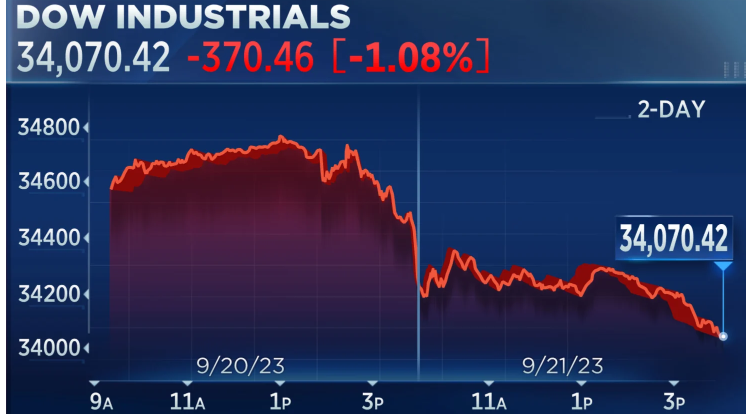 Global stock markets are showing signs of unease, with U.S. indices like the Dow Jones Industrial Average and Nasdaq Composite dipping slightly on September 10, 2024. Investors are adopting a cautious approach ahead of key labor market data set to be released later this week. This data is expected to offer further insights into the health of the U.S. economy and the potential for future Federal Reserve interest rate hikes.
Global stock markets are showing signs of unease, with U.S. indices like the Dow Jones Industrial Average and Nasdaq Composite dipping slightly on September 10, 2024. Investors are adopting a cautious approach ahead of key labor market data set to be released later this week. This data is expected to offer further insights into the health of the U.S. economy and the potential for future Federal Reserve interest rate hikes.
The Dow Jones closed down by 0.3%, while the Nasdaq saw a 0.2% decline, primarily driven by investor uncertainty. Market analysts are speculating that the Federal Reserve’s next steps may depend heavily on upcoming job figures, which could either signal a slowdown or continued momentum in the economy. The Fed has been grappling with how to balance inflation control without stifling economic growth, making these labor reports crucial.
Meanwhile, global oil prices rebounded due to concerns over tightening supplies. This uptick was largely driven by production cuts from major oil exporters such as Saudi Arabia and Russia. Both countries have extended their supply cuts into the fourth quarter of 2024, pushing oil prices higher. Brent crude oil prices rose by 2%, closing at around $92 per barrel. This has provided some relief for energy stocks, which saw a boost amid broader market dips.
However, the rise in oil prices has renewed inflationary fears globally, as higher energy costs could translate into increased production costs across industries. For sectors such as airlines and manufacturing, this could mean tighter profit margins in the coming months.
 The market is also keeping an eye on geopolitical tensions, particularly in the Middle East and Russia, where conflicts and policy decisions could further affect energy markets. Investors are weighing these risks alongside more traditional concerns like inflation, employment trends, and central bank policies.
The market is also keeping an eye on geopolitical tensions, particularly in the Middle East and Russia, where conflicts and policy decisions could further affect energy markets. Investors are weighing these risks alongside more traditional concerns like inflation, employment trends, and central bank policies.
Despite overall market downturns, the energy sector outperformed due to rising oil prices. Shares of major oil companies, including ExxonMobil and Chevron, saw gains as they benefited from the increased crude prices. However, other sectors, particularly technology and financials, lagged as the market’s broader uncertainty weighed on performance.
The upcoming labor market report is crucial, as any indication of a strong job market could prompt the Federal Reserve to maintain or even increase interest rates to tame inflation. Conversely, weaker-than-expected job data could fuel speculation of a more dovish approach by the Fed, leading to potential market gains. Investors will also be watching inflation metrics closely, as energy prices continue to play a key role in shaping market sentiment.
For now, the global market remains in a delicate balancing act, with economic data, oil prices, and geopolitical tensions all playing a significant role in determining the direction of stocks in the weeks ahead.
Ennywealth


